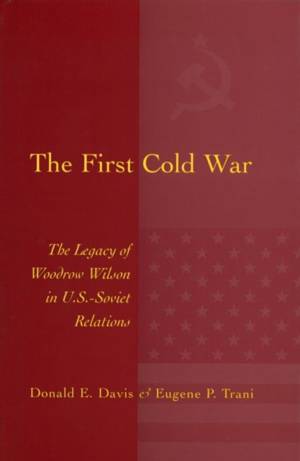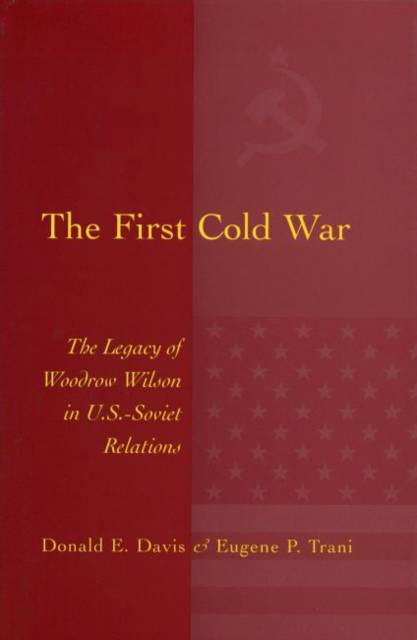
En raison d'une grêve chez bpost, votre commande pourrait être retardée. Vous avez besoin d’un livre rapidement ? Nos magasins vous accueillent à bras ouverts !
- Retrait gratuit dans votre magasin Club
- 7.000.000 titres dans notre catalogue
- Payer en toute sécurité
- Toujours un magasin près de chez vous
En raison de la grêve chez bpost, votre commande pourrait être retardée. Vous avez besoin d’un livre rapidement ? Nos magasins vous accueillent à bras ouverts !
- Retrait gratuit dans votre magasin Club
- 7.000.0000 titres dans notre catalogue
- Payer en toute sécurité
- Toujours un magasin près de chez vous
The First Cold War
The Legacy of Woodrow Wilson in U.S.-Soviet Relations
Donald E Davis, Eugene P Trani
Livre relié | Anglais
84,95 €
+ 169 points
Description
In The First Cold War, Donald E. Davis and Eugene P. Trani review the Wilson administration's attitudes toward Russia before, during, and after the Bolshevik seizure of power. They argue that before the Russian Revolution, Woodrow Wilson had little understanding of Russia and made poor appointments that cost the United States Russian goodwill. Wilson later reversed those negative impressions by being the first to recognize Russia's Provisional Government, resulting in positive U.S.-Russian relations until Lenin gained power in 1917. Wilson at first seemed unsure whether to recognize or repudiate Lenin and the Bolsheviks. His vacillation finally ended in a firm repudiation when he opted for a diplomatic quarantine having almost all of the ingredients of the later Cold War. Davis and Trani argue that Wilson deserves mild criticism for his early indecision and inability to form a coherent policy toward what would become the Soviet Union. But they believe Wilson rightly came to the conclusion that until the regime became more moderate, it was useless for America to engage it diplomatically. The authors see in Wilson's approach the foundations for the "first Cold War"--meaning not simply a refusal to recognize the Soviet Union, but a strong belief that its influence was harmful and would spread if not contained or quarantined. Wilson's Soviet policy in essence lasted until Roosevelt extended diplomatic recognition in the 1930s. But The First Cold War suggests that Wilson's impact extended beyond Roosevelt to Truman, showing that the policies of Wilson and Truman closely resemble each other with the exception of an arms race. Wilson's intellectual reputation lent credibility to U.S. Cold War policy from Truman to Reagan, and the reader can draw a direct connection from Wilson to the collapse of the USSR. Wilsonians were the first Cold War warriors, and in the era of President Woodrow Wilson, the first Cold War began.
Spécifications
Parties prenantes
- Auteur(s) :
- Editeur:
Contenu
- Nombre de pages :
- 360
- Langue:
- Anglais
Caractéristiques
- EAN:
- 9780826213884
- Date de parution :
- 26-08-02
- Format:
- Livre relié
- Format numérique:
- Genaaid
- Dimensions :
- 166 mm x 243 mm
- Poids :
- 716 g

Les avis
Nous publions uniquement les avis qui respectent les conditions requises. Consultez nos conditions pour les avis.






